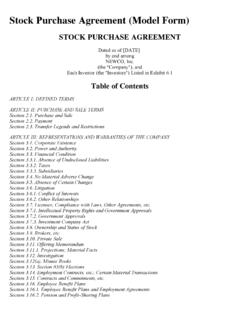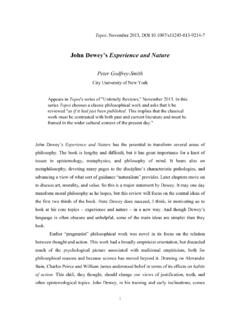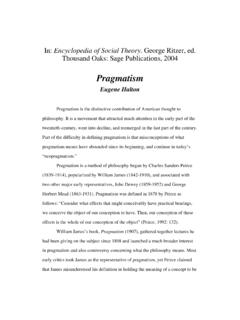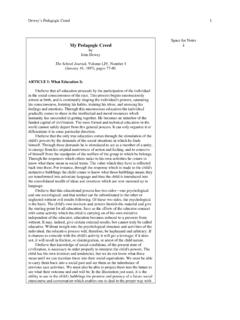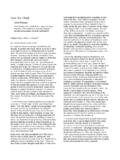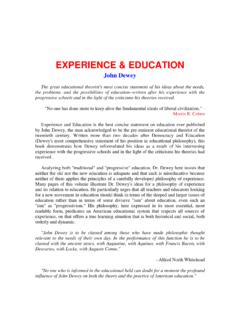Transcription of Dewey, Democracy, and Democratic Experimentalism
1 Contemporary Pragmatism Editions Rodopi Vol. 9, No. 2 (December 2012), 35 55 2012 dewey , democracy , and Democratic Experimentalism Charles Sabel dewey s approach to the problem of organizing reform of democracy focused on rethinking the ideal of Democratic participation, or, backing up a step, the conditions of communication eventually shaping it. He left the design of institutions to advance joint problem solving and individual development to the outcome of this process. To the extent that he had concrete institutional plans they vacillated in focus between the society as a whole and the immediate local community. Democratic Experimentalism looks to connect these levels to correct the defects of an exclusive focus on either. 1. Introduction dewey s enduring achievement was to present a compelling account of the mutual constitution of the individual and society, struggling together to extend the limits of their knowledge in response to surprising failures of what they thought they already knew, and to establish an ideal of democracy as that form of self-government which, under ever new circumstances, affords the greatest possible scope to the social intelligence of problem solving and the flourishing of individual character as its condition and product.
2 dewey shares with Marx the idea of the sociability of production and the deformation of the self through its denial, with Rawls the idea of recognition of the full, individual humanity of fellow citizens as the first and most fundamental constraint on political order. Yet he had a sense of the moral and political malleability of the technical world a recognition that the organization of production conditions politics yet is also profoundly conditioned by it and a congenital understanding of the individual in democracy alien to the former. He had an intellectually productive absorption in the lived interaction between individual and society alien to the latter. In an uncertain world, where innovations in production and changes in individual life courses and gender roles upend each other, settled forms of assuring social solidarity fail, and traditional representative democracy seems more an institutional casualty of these changes than an instrument for an effective public response to them, committed democrats will want to learn from dewey .
3 CHARLES SABEL 36 Yet when it came to questions of institutional design of specifying how various domains of activity might be organized to advance joint problem solving and individual development dewey had, to the evident irritation of some of his most ardent admirers and closest readers,1 and apart from limited and ultimately vexed observations about schooling, next to nothing to say. His reticence in these matters is a puzzling double default. First there is the very general (but in debate infrequently remarked) absence in dewey s work of discussion of what might be called pragmatist institutions. No one understood better than dewey that habit, or experience accrued into unnoticed assumptions, enabled action by allowing the concentration of attention on troubling violations of (habitual) expectations; no one understood better than he that habit could also harden into routine, making unnoticed assumptions inaccessible to revision and trapping us in experiences only possible if we do not attempt to scrutinize them fully in the event.
4 dewey stressed as well the mutual dependence of individuals and institutions, and the way the stunting of the one impoverished the other. Institutions and individuals thus had to change together or not at all. Given all this it is puzzling that he did not pose the question of how to design institutions that reduce the chance of organizational habits congealing into limiting routines, or that can detect and dis-entrench routines that have become obstructive. Second, there is the more specific and more frequently noted absence of discussion of the design of democracy itself, of institutions of public choice serving the ideal of democracy as enabling individual flourishing, and adapted to the circumstances of the day. dewey was nothing if not a fallibilist. He held that inquiry in its exemplary form in the laboratory was a process of continuous self-correction, of learning from mistakes.
5 The kind of joint searching or social inquiry he urged outside the laboratory would be, if anything, more prone to error and more in need of correction. More generally he insisted that ends and means were mutually transformative as in art, where the painting becomes the picture or, put another way, that theories and first principles were inevitably redefined in the process of applying them. What he held in general he held to be particularly true of democracy ; one of his recurrent arguments was that the means that serve democracy , and its proximate ends, must be rethought as circumstances change. Horseback empiricism sufficed to show that in this he was right. The mismatch between the 19th century institutions of American democracy , informed by if not premised on a citizenry of small holders, and the mass-production, mass-consumption society of large firms and associations of the US in the 1920s was palpable.
6 The rise of fascism left no doubt that democracies could make or abide horrific choices. The bureaucratic, centralizing tendencies of the New Deal troubled dewey , suggesting that he distinguished between decisions authorized by democracy and organizational decisions that served his Democratic ideal. In the background, but surely not out of mind, was the continuing public controversy over judicial supremacy and the people s relation to the constitution that generally shaped the Progressive Yet, though understanding and defense of democracy and the question of its design dewey , democracy , and Democratic Experimentalism 37 seemed indissolubly linked in fact and by the lights of his own ideas, dewey had as little to say about the mechanisms for avoiding and correcting error in the institutions of democracy as in the design of institutions generally.
7 Democratic Experimentalism addresses the problem of the design of pragmatist institutions and cognate problems of making and revising Democratic decisions. The aim is not of course to try to say what dewey might have or should have said, and still less to chide him for not saying it. Rather the goal is to make conceptually more cognizable and empirically more plausible a form of democracy , situated as today s must be in the uncertain flux of experience, sharing dewey s aspiration of linking adaptive social learning and the greatest possible development of individuality, and assuming (from a combination of conviction and the assessment of experience) that these goals cannot be achieved by harnessing market mechanisms to the largest of public The design of pragmatist institutions is the theme of Bill Simon s contribution to this symposium.
8 He shows that private firms and public-sector institutions have, independently, hit upon mechanisms by which small break-downs in operations trigger a wide ranging but not unfeasibly open-ended search for the deep or root causes of the disruption, and when warranted, a revision of the procedures that led to it, or even the goals from which the procedures were derived. A leading private-sector example is the Toyota production system, where the removal of buffer inventories (the shift to just-in-time production) means that breakdowns must be fixed, and their causes eliminated as they occur so that if production is to be continuous, so too must be improvement. In many regulatory settings the triggering mechanism is a system for registering, analyzing and eliminating the causes of near misses accidents (in air traffic control or nuclear power generation) that only by chance did not occur, and therefore, properly understood, illuminate some of the otherwise unobservable conditions that can lead to catastrophe.
9 In the provision of public services, such as child welfare, the triggering mechanism can be a searching review of randomly selected cases, with the aim of determining whether the routines for diagnosing and responding to the problems of especially distressed families were followed to good effect, and if not whether the cause of the problem was a local defect in decision making or a defect in the routines or goals of the agency. In all these cases rule following comes to include the obligation to consider whether the current rule should be revised, and if so how. To act accountably under these novel institutional conditions means either to act in conformity to a rule, or to provide a compelling account (as gauged by the experience of peers in similar situations) of why it is reasonable to deviate from the prescribed practice locally and perhaps more generally.
10 Accountability is forward as well as backward looking. This note extends the discussion of pragmatist institutions to the organization of some key aspects of democracy . A central theme is that, as with pragmatist institutions generally, innovations that work under current conditions enlarge possibilities for participation and experimentation, and so are compatible CHARLES SABEL 38 with and may well advance the chances of realizing some variant of dewey s Democratic ideal. Many, perhaps most of these innovations are permissible under current understandings of the laws of constitutional democracies and the administrative state. In many cases, they develop without disturbing the usual business of state, and, at least partly for that reason, remain largely invisible to the larger public. But the assumption and incipiently the experience is that as more existing and new political actors are drawn to take advantage of the opportunities afforded by experimentalist innovations debate will spring up about their legitimacy and permissible scope, creating the potential but only that for a public re-elaboration of Democratic ideals and the creation of more inclusive forms of participation.
